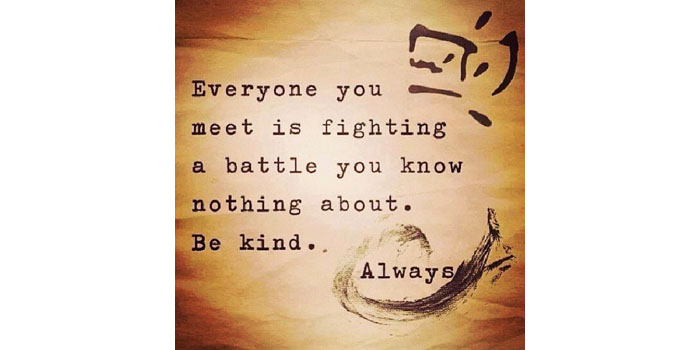|
Last updated October, 2018. note: we link to our free guide to mindfulness and meditation at the bottom of the page (no email required). It's time for another installment of "Question and Answer Tuesdays!" Brian writes: "I always hear 'be compassionate,' and sometimes it's a challenge. I think I do the right thing, and I help someone who is genuinely in need, but I also know that people take advantage of the generosity of others. If they don't work hard to help themselves and improve their lives, I feel it is their own fault and they aren't deserving of assistance. Is this wrong thinking, and how can I be more compassionate if it is?" Hi Brian, your thoughts on compassion are common. It comes down to judging others, and determining who you think is - and isn't - worthy of help. The problem with this thinking is there will always be someone who "takes advantage" of the system, but you can't punish everyone because of it. So, in essence, I'm advising you to drop judgment. Which logically leads to the question: "How do I stop judging people?" There are people in need everywhere, and it's human nature to assume their situations are self-created. That person asking for money? Well, he should just get a job (and, he probably drinks and does drugs!). That single mother who needs help? Well, why did she have kids in the first place (and, is that an iPhone she has!?!)? We are skilled at rationalizing and creating stories about the things we see, and that makes it easy to judge, blame, and ignore. We've all been told that to be more compassionate, you simply need to "put yourself in their shoes." Imagine yourself as the homeless person, the single mother, the alcoholic, or the guy out of work for over a year. But, this advice rarely helps. Why? It doesn't help because we rationalize that, if we were in their shoes, we would have made better decisions and taken better actions:
The list goes on and on. And, that's the flaw in our thinking. You can't think of it as YOU being placed in THEIR shoes, but still making decisions as YOU. That's not how it works. You have to think of YOU actually being THEM, atom for atom. You aren't just making YOUR decisions in THEIR shoes - you are them, having been subject to the exact causes and conditions that put them in the place they are right now. Those causes and conditions stretch back in time, and include the decisions and actions of parents, grandparents, and other people we have no insight in to. If you truly contemplate this, you will realize the odds of you ending up different than them are zero. But, you have to be honest. You have to admit you could never know all of the factors (causes and conditions) involved in making someone who they are. And, you have to drop the reflex of thinking of it as YOU in THEIR shoes, but still making decisions as YOU. That is the heart of compassion. It's not writing a check, giving a homeless person $5, or working in a soup kitchen. Those things are important, but they aren't compassion. Compassion is dropping our rigid views and judgments. Compassion is admitting that, if we were born into the same circumstances and exposed to the exact same things - if we switched places with the other person atom for atom and were subject to everything they were exactly as they were, we would most definitely have ended up at the point they are now. As with anything else, this requires practice. You can't just "flip a switch" and drop your judgment and conditioning. It's worth the effort, though: true compassion not only dictates how you treat the world around you, it dictates how you treat yourself as well. As The Dalai Lama said: A mind committed to compassion is like an overflowing reservoir - a constant source of energy, determination and kindness. This is like a seed; when cultivated, gives rise to many other good qualities, such as forgiveness, tolerance, inner strength and the confidence to overcome fear and insecurity. The compassionate mind is like an elixir; it is capable of transforming bad situations into beneficial ones. Stop dealing with the symptoms.Stress, anxiety, self-confidence issues, the inability to stop bad habits, problems with sleep and focus, and on and on and on.
These and the other things we struggle with every day are only symptoms. The good news is, they all share the same root cause. The bad news is, if you don't address that root cause, the symptoms will keep coming back no matter what you do. That's why we wrote "An owner's guide to the mind." For almost 20 years, people have been using it to address the root cause of their daily struggles. Click here to view the contents and learn more. Comments are closed.
|
